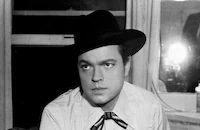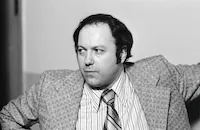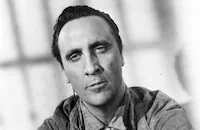Get to Know Your Rabbit

Brief Synopsis
Cast & Crew
Brian De Palma
Tom Smothers
John Astin
Katharine Ross
Orson Welles
Suzanne Zenor
Film Details
Technical Specs

Synopsis
In Los Angeles, marketing analyst Donald Beeman works frantically while his boss, Paul Turnbull, deflects all the drudgery to him. Overwhelmed and underappreciated, Donald suddenly decides that he has had enough and strides out of the building. In his swank apartment with his pretty fiancée Paula, Donald is surprised by the appearance at the door of Mr. Weber, who says he is a piano tuner. When Donald explains that he has no piano, Weber inspects the apartment, then cooks him breakfast in bed as an apology for the interruption. Serving him the meal, Weber announces that he has realized that he does not need pianos and will seek more customers without them. Donald then mentions to Paula that he is quitting his job, and she threatens to leave him. While Donald attends the first lesson for his chosen new career, that of a tap-dancing magician, Turnbull pulls him out of the classroom to reveal that he has Donald's mother and father outside in a cupboard. Turnbull hopes they will convince Donald to return to the office, but when Donald greets them warmly and says that he hopes to spend more time with them, Turnbull immediately ushers them onto a train home. Days later, Donald finds Paula distraught over his career change, but seduces her easily. They are awakened by a phone call from Turnbull, who announces that he will not accept Donald's resignation. After Paula declares that she will not make love to him until he gives up his scheme, she tests him by throwing herself at him, then declares she is leaving him. Donald gives up his apartment and, newly outfitted with seedy clothes and a cheap hotel room, practices his act tirelessly. One night, a bra salesman named Vic bursts into Donald's room looking for a party and convinces Donald to go along with him. Finally they locate the party, a hugely crowded but nearly silent room in which Donald meets Susan, who does not seem to mind when Vic calls her a "cheap broad." The three go to Vic's showroom, where he has Susan try on his bras but is furious when she prefers Donald to Vic's inventory. Donald brings Susan home and the next morning sees her off on a cruise ship. At the dock is his magic teacher, Mr. Delasandro, who is impressed by Donald's sincere desire to learn, but cautions him not to overwork his rabbit. With private lessons, Donald learns his craft over the next few weeks, and soon earns a contract for what Mr. Delasandro reverently refers to as "a tour through America's second-rate bars." His first job is in Elgin, Illinois. In the bus station Donald sees Turnbull, now a drunken vagrant, who explains how he sunk into disrepair after Donald left. Donald offers to make Turnbull his manager and thrills the former executive by fashioning an office space in his hotel room. On tour, Donald finds the dingy towns and near-empty bars exhilarating and writes to Turnbull that he is finally living life at gut level. Donald's words inspire Turnbull to concoct a classified ad for Tap Dancing Magician, Inc., "a seventeen-day drop out plan for tired executives." Within weeks, business is booming out of Donald's hotel room. Meanwhile, Donald travels from strip club to dive bar. At one club, a terrific-looking girl watches adoringly and joins him onstage as a volunteer for his escape sack trick. When the act fails, however, they fall to the ground together in the sack and her date rushes the stage in a jealous rage. Donald brings the girl to his hotel, where they talk all night and then make love. Upon his return to Los Angeles, he finds his hotel room transformed into a busy office suite, and quickly returns to tour again. At one stop, he watches as a pilot with a fear of flying is coaxed out of a tree by a policeman and stewardess. Over the months, he continually returns to the girl's town and falls into bed with her each time. When he goes home once again, Turnbull's company, now called TDM, is a gigantic corporation occupying an entire skyrise building. Donald's photographs adorn the walls, and similarly dressed magicians crowd the halls, being trained and graduated in assembly-line fashion. In Turnbull's palatial office, Donald finds his former boss hiding in a closet, overwhelmed by his success. To ease Turnbull's mind, Donald reluctantly agrees to stay on for a few days to help out. Soon, Donald once again is engulfed by business concerns, and Turnbull is too busy to speak to him. Donald wanders his office, perusing the costumes and props encased in glass. Breaking open the cases, he takes out the escape sack and steps inside it. Soon after, he is back on tour, traveling with the girl, their baby, and several new rabbits.

Director

Brian De Palma
Cast
Tom Smothers
John Astin

Katharine Ross

Orson Welles
Suzanne Zenor
Samantha Jones

Allen Garfield
Hope Summers

Charles Lane
Jack Collins
Larry D. Mann
Jessica Myerson

M. Emmet Walsh
Helen Page Camp
Pearl Shear
Robert Ball
George Ives
Anne Randall
Bob Einstein
King Moody
Judy Marcione
Dennis Robertson
Bill Beifuss
David Carlile
Maurice Wells
Robert Peoples
Gayla Kenny
Judy Parker
Dee Carroll
Joyce Corbin
Lyn Guild
Floy Dean
Jim Henaghan
Jack Bernardi
Al Checco
Jill Hall
Dinah Anne Rogers
Sid Kane
Neil J. Schwartz
Jerry Young
Tammy Lee
Eddie Frank
Don Ross
Martin Eric
Gail Bonney
Cliff Medaugh
Joe Ross

Robert Carson
Bert Whaley
Gina Dair
Daryle Ann Lindley
Skip Burnham
Marilyn Blower
Pitt Herbert
Art Lewis
Monty Margetts
Robert W. Hitchcock
Gary Waynesmith

Timothy Carey
Beverly Powers
William Long Jr.
Robert Cleaves
Sam Jarvis
Anna Aries
Byron Kane
Jim Mills
Lyn Edgington
Betty Best
Rodney C. Hoeltzel
Regan Sherick
Diane Loomen
Carol Wells
Jerry Rannow
Michael Mcdonald
Janet Clark
Murray Pollack
Crew
John Alonzo
Steve Bernhardt
Robert Birnbaum
Robert Birnbaum
Harry Blackstone Jr.
Duke Callahan
Ralph Carter
Peter Colbert
Jordan Crittenden
Owen Crompton
Ray De La Mott
Sally Edwards
Jack Elliott
Allyn Ferguson
Bruce Fowler
Robert Full
Paul Gaer
Randy Glass
Alan Gordon
Richard Hart
Phillip Holland
Nessa Hyams
Dennis Jones
Hubie Kerns
Cliff King
Gary Liddiard
John Linder
Red Lindstrom
William Malley
Jim Martell
Robert Miller
Peter Nelson
Jim Payne
Wayne Reed
Jean Burt Reilly
Herb Rindenow
Ron Riner
Jack Roberts
Ben Sad
Ernie Sawyers
Gordon Scott
George Shanahan
Steve Siporin
Amy Siskin
Frank Urioste
Bill Vanhoek
Marvin Weldon
Vernon White

Film Details
Technical Specs

Quotes
Trivia
Brian De Palma was fired from this film.
Notes
Get to Know Your Rabbit uses several experimental film techniques such as split screens, fantasy sequences and surreal or absurd situations. When "Paul Turnbull" recounts his slide into alcoholism, it is shown in a fast-motion, black-and-white sequence. The last scene of the film shows Katharine Ross sitting in the back seat of a bus, a reference to the final shot of her 1967 film The Graduate (see below).
Famed magician Harry Blackstone, Jr. served as the film's technical advisor. According to press notes, he taught Tom Smothers many of the routines made famous by his father, Harry Blackstone, Sr. Despite his extensive television experience, Get to Know Your Rabbit marked Blackstone's only foray into films. In addition to his legendary film career, Orson Welles, who plays the magic teacher "Mr. Delasandro," was a semi-professional magician who frequently performed magic shows.
Get to Know Your Rabbit was shot in 1970 but did not receive its first theatrical screening until June 1972. According to the Los Angeles Times review, "Nobody told the director his film was being press-screened or that it was opening." Director Brian De Palma related in a contemporary interview that Smothers disliked the film and after disappearing for two days of shooting, refused to return for retakes. In addition, De Palma stated that Warner Bros. was unhappy with the finished film and so hired Peter Nelson, credited onscreen as executive producer, who re-edited the footage, directed a new sequence and re-instated previously excised material. The director described the original ending to the film as follows: As "Donald Beeman" performs on The Tonight Show, he realizes his magic show has become a commodity and so performs a trick that appears to the audience as if he has actually sawed a rabbit in half. With this apparent failure, Don is finally free from everyone's expectations and desires.
The picture marked Smothers' feature film debut. Along with his brother Tom, Smothers starred in The Smothers Brothers Comedy Hour on CBS from February 1967 to April 1969. An innovative, cutting-edge variety show, the series generated controversy by satirizing politics and religion, referencing sex and drugs, and showcasing blacklisted musicians. After the network cancelled the series, the Smothers launched an eventually successful breach-of-contract lawsuit. They split up for a time around 1971, then launched several new, ultimately failed, variety shows, reviving The Smothers Brothers Comedy Hour briefly in 1988 and 1989. A modern source adds Paul Bradley to the cast. Jordan Crittenden received a nomination for a 1973 Writers Guild of America award for Best Comedy Written Directly for the Screen.

Miscellaneous Notes
Released in United States 1996
Released in United States Winter January 1, 1972
Released in United States 1996 (Shown in New York City (Film Forum) as part of program "Out of the Seventies: Hollywood's New Wave 1969-1975" May 31 - July 25, 1996.)
Released in United States Winter January 1, 1972











